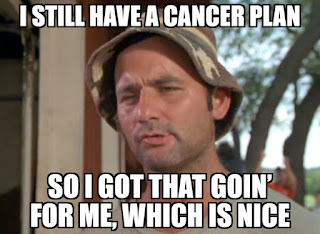It's that time of year again when a lot of people are making changes to their various medical plans. The choices you make during open enrollment will be affect how much your medical bills will be next year, unless you are fortunate enough not to have any.
This past February I experienced my first major health event and spent nearly a week in the hospital. The hospital bill was around $75,000, with my major medical insurance picking up the tab for most of it. A small change in my open enrollment strategy could have cost me a great deal more and set me back financially.
This is the struggle during open enrollment. Trying to predict what your medical bills will be is nearly impossible, even with my Magic 8 Ball. I had always been a fairly healthy person, so being admitted and confined to a hospital was not in my gameplan when trying to decide which medical plan I would go with. I was just trying to find a policy that I could afford.
That is why it is so important to have some good supplemental plans at your disposal. Premiums for medical insurance go up each year. Medical inflation outpaces all of our other bills. Having a good disability plan or other coverage in place can help you if you are left with high deductibles or copays.
People will sometimes ask why I think it's so important to have more than life insurance and health insurance. My response is as follows: Health insurance won't pay all of the bills if something serious happens. Add to that the fact that people generally don't have enough life insurance to cover all the expenses their family will have if they die. Supplemental (or voluntary plans, as they are known) can help you fill in those gaps.
To this end, I am a huge proponent of supplement policies, not just because I sell them, but because I own them myself. I personally know the value of a Hospital Indemnity policy. I have a cancer plan on my family because I know that the out-of-pocket expenses are extremely high. My disability insurance policy will help cover my bills if I am sick or hurt and can't work.
I don't want my friends to have to set up a GoFundMe page because they don't have the money to pay their bills. But I do want my friends (and clients) to have a good accident insurance policy so I don't have to contribute to their crowdfunding when they get hurt.
These plans all have a place and none will break my bank account. However, not having an extra policy or two in case of a serious illness or injury could destroy your family's finances. The vast majority of bankruptcies in this country are caused by major medical events. According to CNBC, 137million Americans were struggling with medical debt in 2019. And TD Ameritrade found that medical expenses are the number one reason why people of all ages cash out their 401(k)'s or other retirement savings.
The majority of these types of plans are sold through the workplace, with employers deducting the premiums from the employees' paychecks. For those of us who are business owners, contract employees and otherwise self-employed, Surf Financial Brokers has comparable plans that can be purchased on an individual basis. And we can take your application right over the phone. Check out our website and book an appointment that works for you to make sure you have this valuable coverage.
Chris Castanes is the president of Surf Financial Brokers, helping people find affordable life and disability insurance coverage. He's also is a professional speaker helping sales people be more productive and efficient and has spoken to professional and civic organizations throughout the Southeast. And please subscribe to this blog! Thanks!





